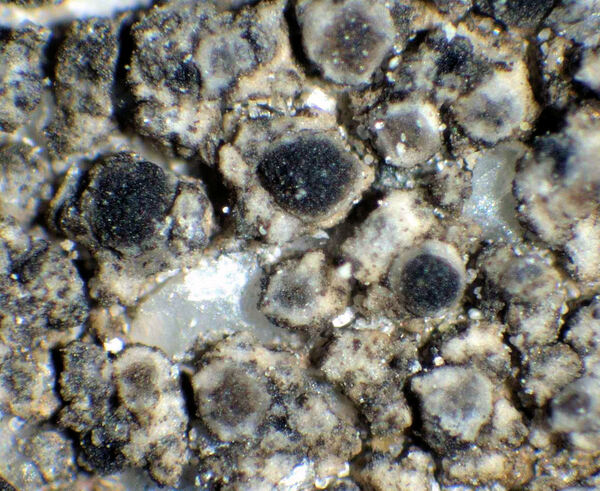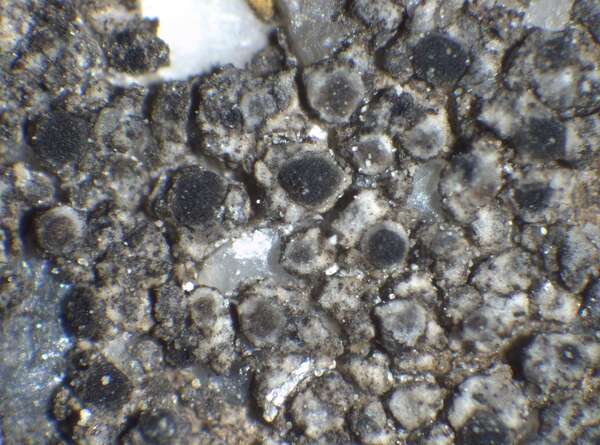Rinodina guzzinii Jatta
N. Giorn. Bot. Ital., 23: 354, 1891.
Synonyms: Rinodina bischoffii var. ochrata J. Steiner; Rinodina controversa var. terricola Flagey
Description: Thallus crustose, episubstratic, continuous to rimose-areolate, pale to dark grey, sometimes with a whitish pruina, without an evident prothallus, the areoles up to 0.4-0.9(-1.2) mm wide, flat to convex. Apothecia lecanorine, adnate to sessile, 0.4-0.6(-0.8) mm across, with a dark brown to black, often whitish-pruinose, persistently flat to rarely slightly convex disc, and an entire, persistent, c. 0.1 mm wide thalline margin. Thalline exciple 90-120 µm wide laterally, corticate, the cortex overlain by an epinecral layer; proper exciple 10-15 µm wide laterally, expanded to 20-40 µm wide at the periphery; epithecium dark brown to reddish brown, K-; hymenium colourless, 80-120 µm high, not inspersed with oil droplets; paraphyses coherent, 2.5-3 µm thick at mid-level, the apical cells 4-6.5 µm wide; hypothecium colourless to pale yellow, inspersed with oil droplets, 60-100 µm high. Asci 8-spored, clavate, the K/I+ blue tholus penetrated by a faintly amyloid apical cushion with parallel or diverging flanks, the wall K/I-, surrounded by a K/I+ blue outer layer, Lecanora-type. Ascospores 1-septate, brown, broadly ellipsoid, (16.5-)18-21(-25) x (10-)11-13(-14) µm, Bischoffii-type, the pigmented band around septum often poorly visible (in which case they appear Physconia-type), with ornamented walls, the ontogeny of type A (apical wall thickening after septum formation). Pycnidia immersed, Conidia bacilliform, 4-7 µm long. Photobiont chlorococcoid. Spot tests: K-, C-, KC-, P-, UV-. Chemistry: without lichen substances.
Growth form: Crustose
Substrata: rocks
Photobiont: green algae other than Trentepohlia
Reproductive strategy: mainly sexual
Subcontinental: restricted to areas with a dry-subcontinental climate (e.g. dry Alpine valleys, parts of Mediterranean Italy)
Commonnes-rarity: (info)
Alpine belt: absent
Subalpine belt: absent
Montane belt: extremely rare
Dry submediterranean belt: rare
Humid submediterranean belt: very rare
Padanian area: absent
pH of the substrata:
1 2 3 4 5
Solar irradiation:
1 2 3 4 5
Aridity:
1 2 3 4 5
Eutrophication:
1 2 3 4 5
Poleotolerance:
0 1 2 3
Altitudinal distribution:
1 2 3 4 5 6
Rarity
absent
extremely rare
very rare
rare
rather rare
rather common
common
very common
extremely common
Loading data...
Occurrence data
Predictive map
Growth form: Crustose
Substrata: rocks
Photobiont: green algae other than Trentepohlia
Reproductive strategy: mainly sexual
Subcontinental: restricted to areas with a dry-subcontinental climate (e.g. dry Alpine valleys, parts of Mediterranean Italy)
Commonnes-rarity: (info)
Alpine belt: absent
Subalpine belt: absent
Montane belt: extremely rare
Dry submediterranean belt: rare
Humid submediterranean belt: very rare
Padanian area: absent
pH of the substrata:
| 1 | 2 | 3 | 4 | 5 |
Solar irradiation:
| 1 | 2 | 3 | 4 | 5 |
Aridity:
| 1 | 2 | 3 | 4 | 5 |
Eutrophication:
| 1 | 2 | 3 | 4 | 5 |
Poleotolerance:
| 0 | 1 | 2 | 3 |
Altitudinal distribution:
| 1 | 2 | 3 | 4 | 5 | 6 |
Rarity
absent
extremely rare
very rare
rare
rather rare
rather common
common
very common
extremely common
Loading data...
Occurrence data
Predictive map









